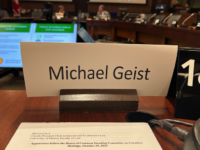Blog
We Need More Canada in the Training Data: My Appearance Before the Standing Committee on Canadian Heritage on AI and the Creative Sector
The government, led by AI Minister Evan Solomon, is currently conducting a short consultation on AI regulation that has attracted criticism for its short time frame. At the same time however, the Standing Committee on Canadian Heritage has been working through a study on AI and the creative sector that may be more limited in scope, but has featured a broader range of perspectives. I had the opportunity to appear before the committee yesterday where I lamented that too often debates on new technology is framed “as a threat, emphasizes cross-industry subsidies, and misses the opportunities new technology presents. We therefore need risk analysis that rejects entrenching the status quo and instead assesses the risks of both the technology and the policy response. I’ll post the full discussion (which ventured into AI transparency, copyright, the news sector, and much more) in a future Law Bytes podcast episode. In the meantime, my opening statement is embedded and posted below.
Senate Bill Would Grant Government Regulatory Power to Mandate Age Verification For Search, Social Media and AI Services Accompanied By Threat of Court Ordered Blocking of Lawful Content
The return of mandated age verification legislation in the Senate – formerly Bill S-210 and now S-209 – has been working its way through a Senate committee with a wide range of witnesses appearing over the past two weeks. I wrote about the new bill in late May, noting that there were some improvements, including an exclusion of sites that “incidentally and not deliberately is used to search for, transmit, download, store or access content that is alleged to constitute pornographic material”. However, I argued that the bill still raised concerns, including the privacy implications of mandated age verification technologies and the establishment of website blocking requirements that would block access to lawful content in Canada. I will be appearing before the committee later this month, but discussion last week at committee merits immediate comment.
Government Reverses on Bill C-2: Removes Lawful Access Warrantless Demand Powers in New Border Bill
The government today reversed course on its ill-advised anti-privacy measures in Bill C-2, introducing a new border bill with the lawful access provisions (Parts 14 and 15) removed. The move is welcome given the widespread opposition to provisions that would have created the power to demand warrantless access to information from any provider of a service in Canada and increased the surveillance on Canadian networks. The sheer breadth of this proposed system was truly unprecedented and appeared entirely inconsistent with Supreme Court of Canada jurisprudence and the Charter of Rights and Freedoms. That was the immediate reaction when the bill was tabled in June (my posts here, here, here, here, here, here, and here. Law Bytes podcasts on the topic here, here, and here) and there was never a credible response forthcoming from government officials. Indeed, if anything, meetings with department officials made plain that this was an embarrassingly rushed, poorly drafted piece of legislation that required a reset.
Why The Recent TikTok Privacy Ruling Swaps Privacy for Increased Surveillance
Last month, federal privacy commissioner Philippe Dufresne, alongside his provincial privacy counterparts from Quebec, Alberta, and British Columbia, released the results of a multi-year investigation into TikTok’s privacy practices. As my Hub opinion piece notes, the outcome was never really in doubt—look under the hood of any social media company and you will find some privacy concerns—but what was both surprising and risky was the commissioner’s demand that TikTok engage in increased surveillance of its users in the name of better privacy practices.
Government Doubles Down in Defending Bill C-2’s Information Demand Powers That Open the Door to Warrantless Access of Personal Information
The return of the House of Commons from the summer break brings with it a resumption of debate on government bills. Topping the list this week is Bill C-2, the omnibus border measures bill, that buries dangerous lawful access provisions that open the door to warrantless access to personal information and increased surveillance capabilities in Canadian networks. I wrote multiple posts on the privacy concerns before the summer (here, here, here, here, here, and here), expressing concern not only with the substantive provisions but also with a bill that combines everything from border measures to restrictions on cash transactions to warrantless access for law enforcement to personal information. The risk is that no issue will get sufficient attention as major issues get lost among the myriad of disparate provisions. For that reason, the lawful access provisions in Parts 14 and 15 in the bill should be removed and contained, if at all, within a separate bill.











